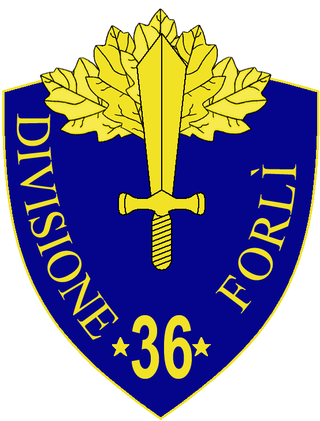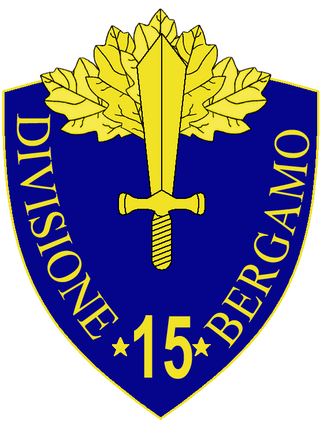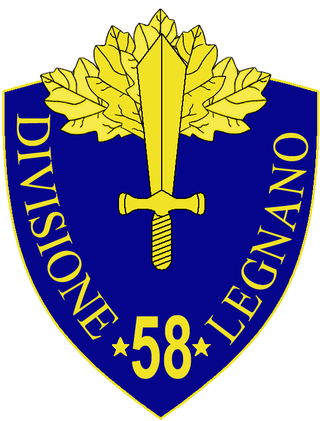Related Research Articles

The 36th Infantry Division "Forlì" was a infantry division of the Royal Italian Army during World War II. The Forlì was classified as a mountain infantry division, which meant that the division's artillery was moved by pack mules instead of the horse-drawn carriages of line infantry divisions. Italy's real mountain warfare divisions were the six alpine divisions manned by Alpini mountain troops. The division was formed on 31 March 1939 and named for the city of Forlì. The division was based in Saluzzo and most of its troops were drafted in the surrounding Langhe region in southern Piedmont. The division's two infantry regiments were based in Alba (43rd) and Saluzzo (44th), with the division's artillery regiment also based in Saluzzo.

The 6th Infantry Division "Cuneo" was an infantry division of the Royal Italian Army during World War II. The Cuneo was formed on 24 May 1939 in Milan by splitting the 58th Infantry Division "Legnano" and was named for the city of Cuneo. The Cuneo was part of the III Corps of First Army that took part in the Italian invasion of France, and then it was part of the XXVI Corps during the Greco-Italian War.

The 7th Infantry Division "Lupi di Toscana" was an infantry division of the Royal Italian Army during World War II. The Division, with the exception of the 78th Infantry Regiment based in Bergamo, was based in Brescia. Despite its name referencing the region of Tuscany, the division was formed by men from Lombardy, especially from Brescia, Bergamo and the surrounding valleys.

The 11th Infantry Division "Brennero" was a infantry division of the Royal Italian Army during World War II. The Brennero was classified as a mountain infantry division, which meant that the division's artillery was moved by pack mules instead of the horse-drawn carriages of line infantry divisions. Italy's real mountain warfare divisions were the six alpine divisions manned by Alpini mountain troops. The Brennero was named for the Brenner Pass between Italy and Austria. The division was based in the western half of South Tyrol with the division's headquarter in Bolzano.

The 15th Infantry Division "Bergamo" was an infantry division of the Royal Italian Army during World War II. The Bergamo was based in Istria and named for the city of Bergamo.
The 211th Coastal Division was an infantry division of the Royal Italian Army during World War II. Royal Italian Army coastal divisions were second line divisions formed with reservists and equipped with second rate materiel. They were often commanded by officers called out of retirement.

The 59th Infantry Division "Cagliari" was a infantry division of the Royal Italian Army during World War II. The Cagliari was classified as a mountain infantry division, which meant that the division's artillery was moved by pack mules instead of the horse-drawn carriages of line infantry divisions. Italy's real mountain warfare divisions were the six alpine divisions manned by Alpini mountain troops.

The 44th Infantry Division "Cremona" was an infantry division of the Royal Italian Army during World War II. The Cremona was formed on 24 August 1939 by splitting the 20th Infantry Division "Curtatone and Montanara" into the 20th Infantry Division "Friuli" and 44th Infantry Division "Cremona". The division was named for the city of Cremona. The division served as occupation force on Corsica and fought German units after the Armistice of Cassibile was announced on 8 September 1943. The division then served with the Italian Co-belligerent Army and remained active until the 1975 Italian Army reform.

The 58th Infantry Division "Legnano" was an infantry division of the Royal Italian Army during World War II. The Legnano's predecessor division was formed on 8 February 1934 in Milan and named for the medieval Battle of Legnano. On 24 May 1939 the division split to form the 6th Infantry Division "Cuneo" and the 58th Infantry Division "Legnano". After the announcement of the Armistice of Cassibile the Legnano resisted the invading German forces. The division's staff and 67th Infantry Regiment "Legnano" were used to form the first unit of the Italian Co-belligerent Army, which fought on the allied side in the Italian campaign. On 17 February 1944 the division's last units joined other commands and the division was officially dissolved.
The 5th Army was a World War I and World War II field army of the Royal Italian Army.
The XXVI Army Corps was an infantry corps of the Royal Italian Army during World War I, the Italian invasion of Albania, and the Greco-Italian War and the subsequent Italian occupation of Greece during World War II.

The Armistice Army or Vichy French Army was the armed forces of Vichy France permitted under the terms of the Armistice of 22 June 1940. It was officially disbanded in 1942 after the German invasion of the "Free Zone" which was directly ruled by the Vichy regime.
The 217th Infantry Division was an infantry division of the German Heer during World War II. It later became the Division Group 217. It is also listed as the 217th Volksgrenadier Division.
German XXXIII. Corps was a corps in the German Army during World War II.
The Italian XXII Army Corps was a formation of the Italian army in World War II.
The VII Army Corps was a corps of the Royal Italian Army between 1877 and 1944.
The XXX Army Corps was a corps of the Royal Italian Army between 1915 and 1943. It was also known as Special Army Corps between November 1940 and June 1941.
The IX Army Corps was a corps of the Royal Italian Army between 1877 and 1944.
The I Army Corps was a corps of the Royal Italian Army between 1877 and 1943.
The XVIII Army Corps was a corps of the Royal Italian Army during World War II.